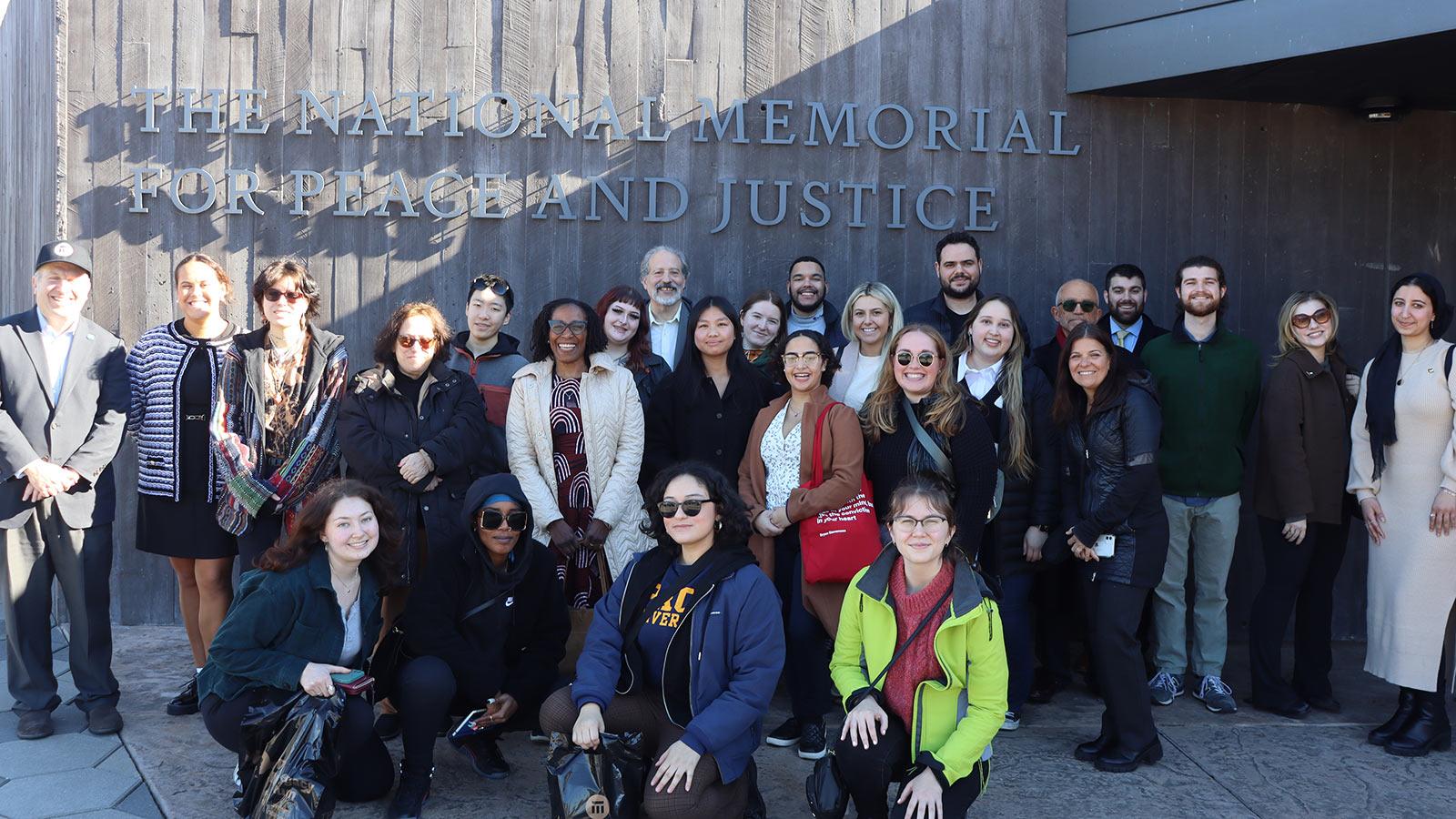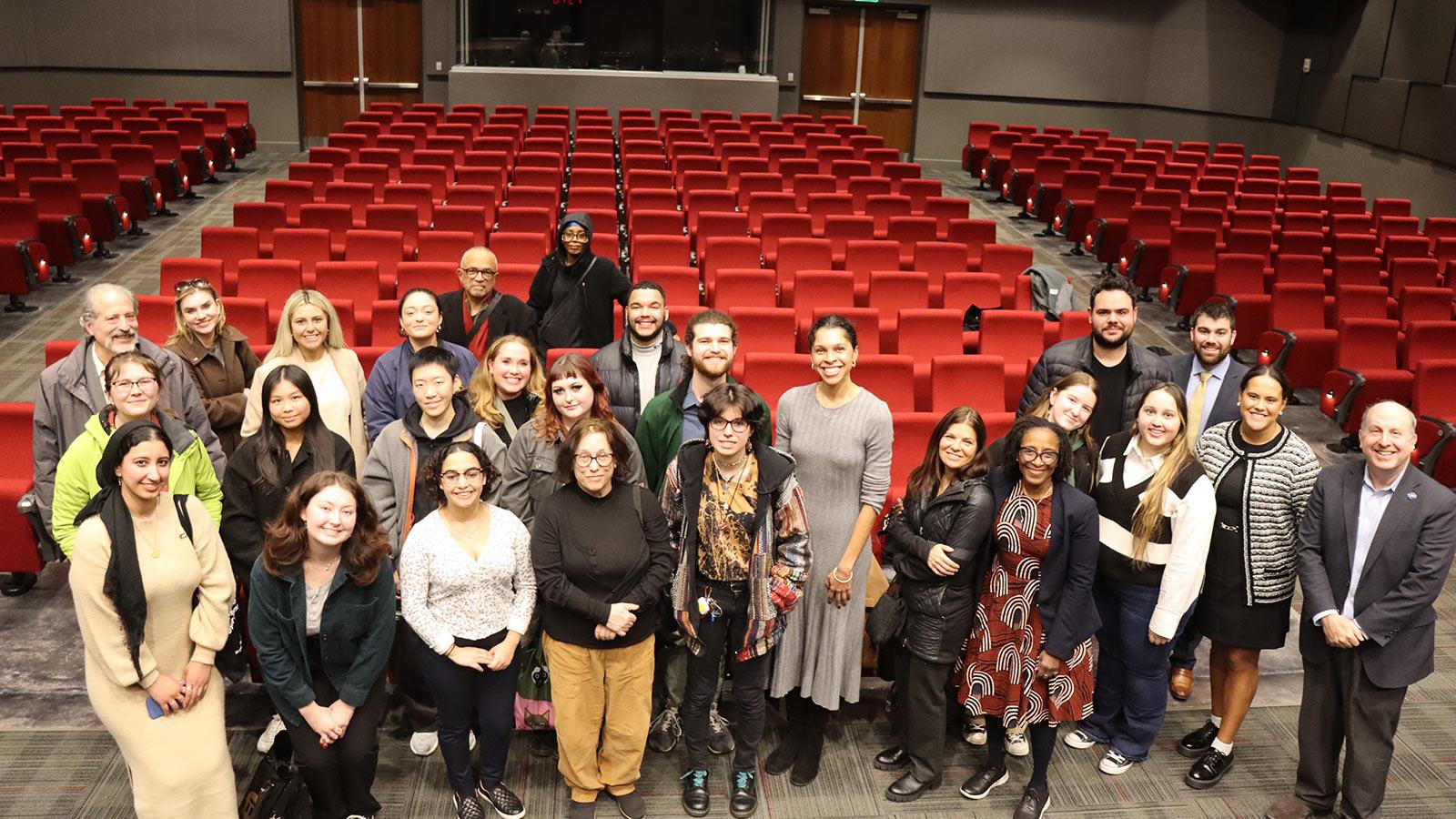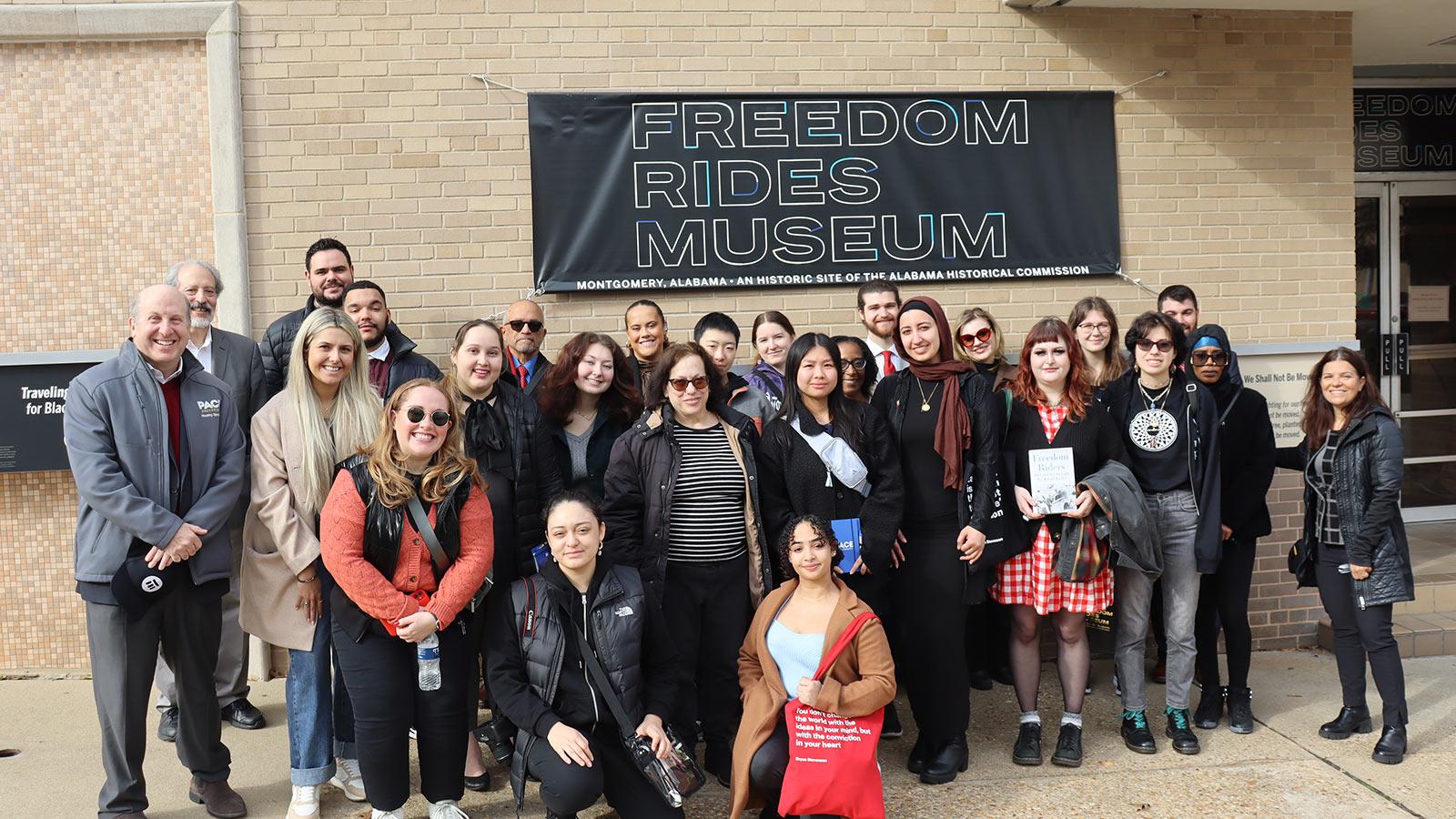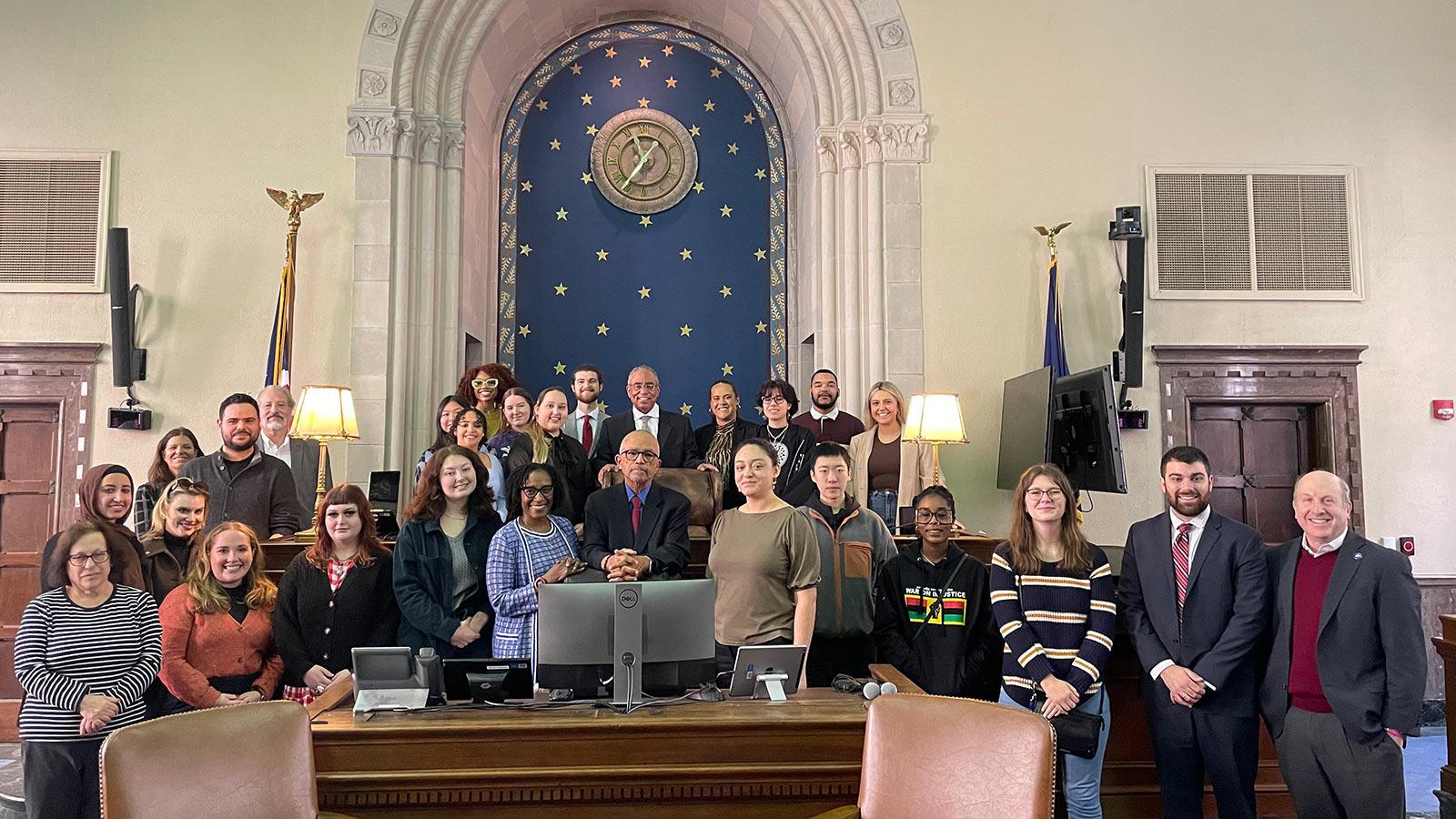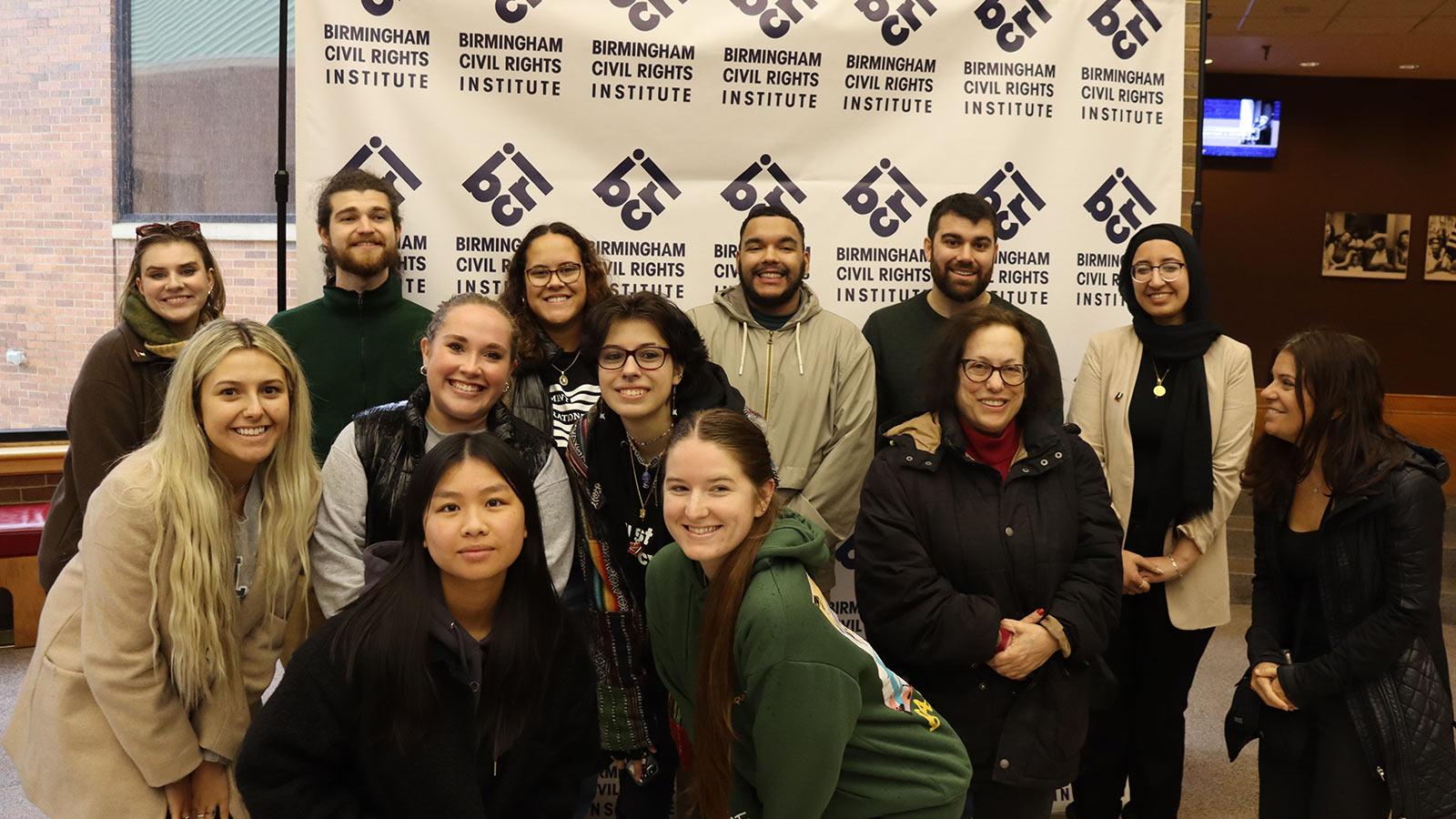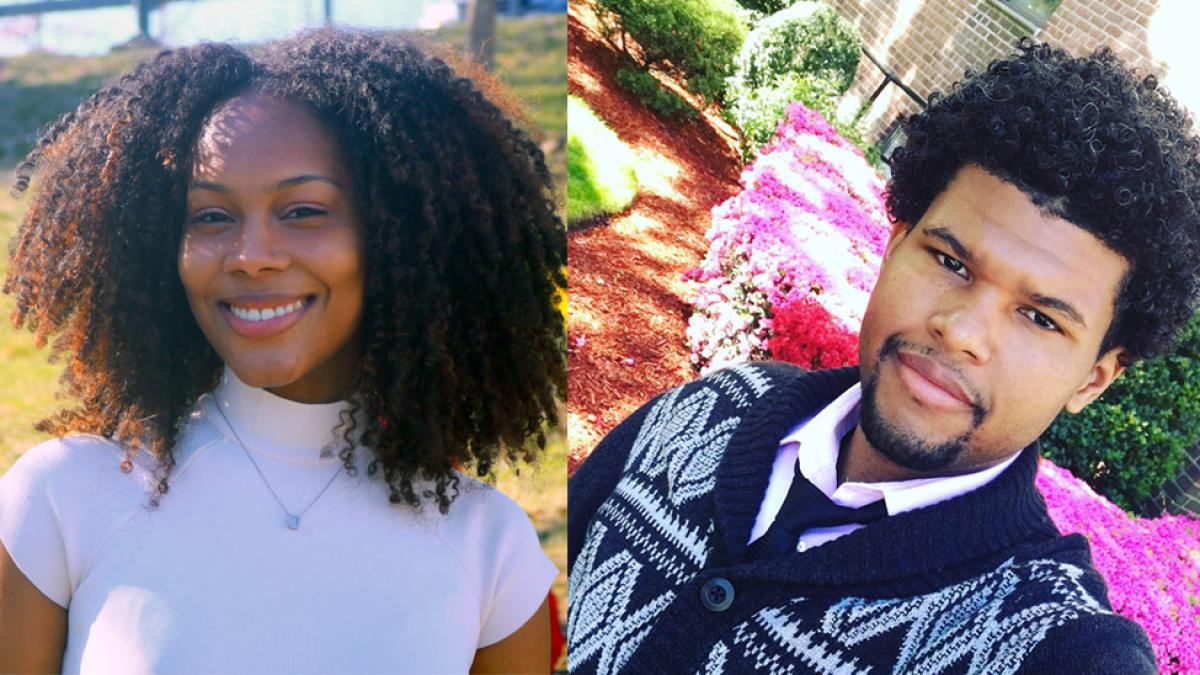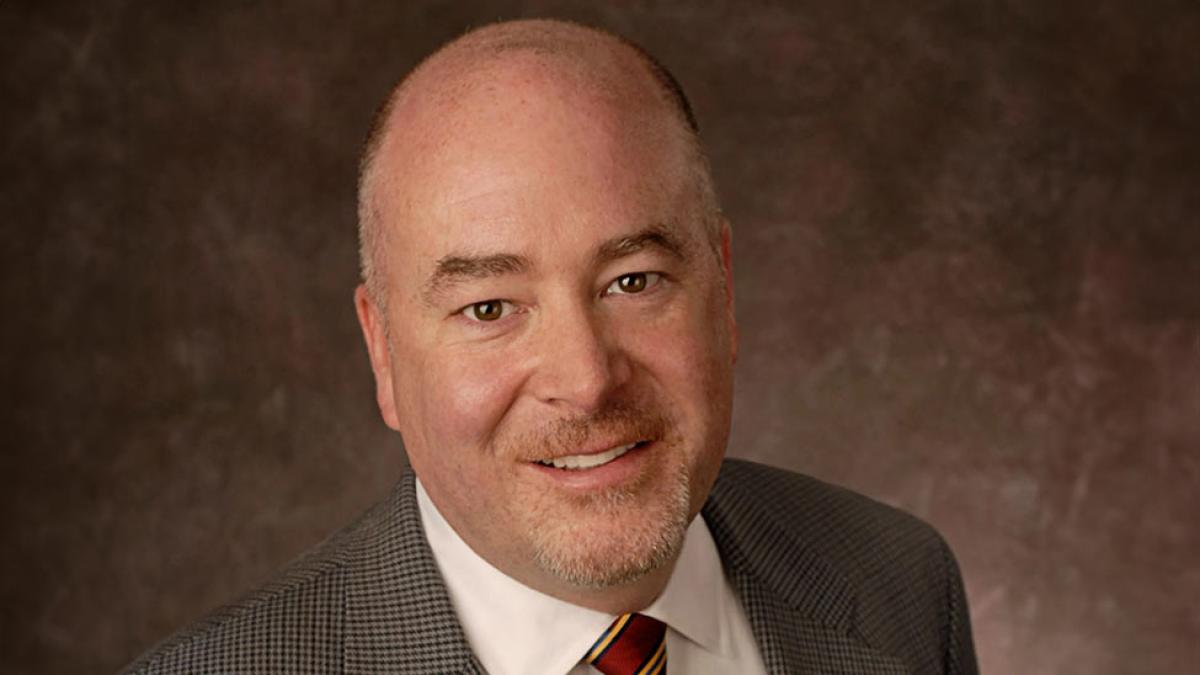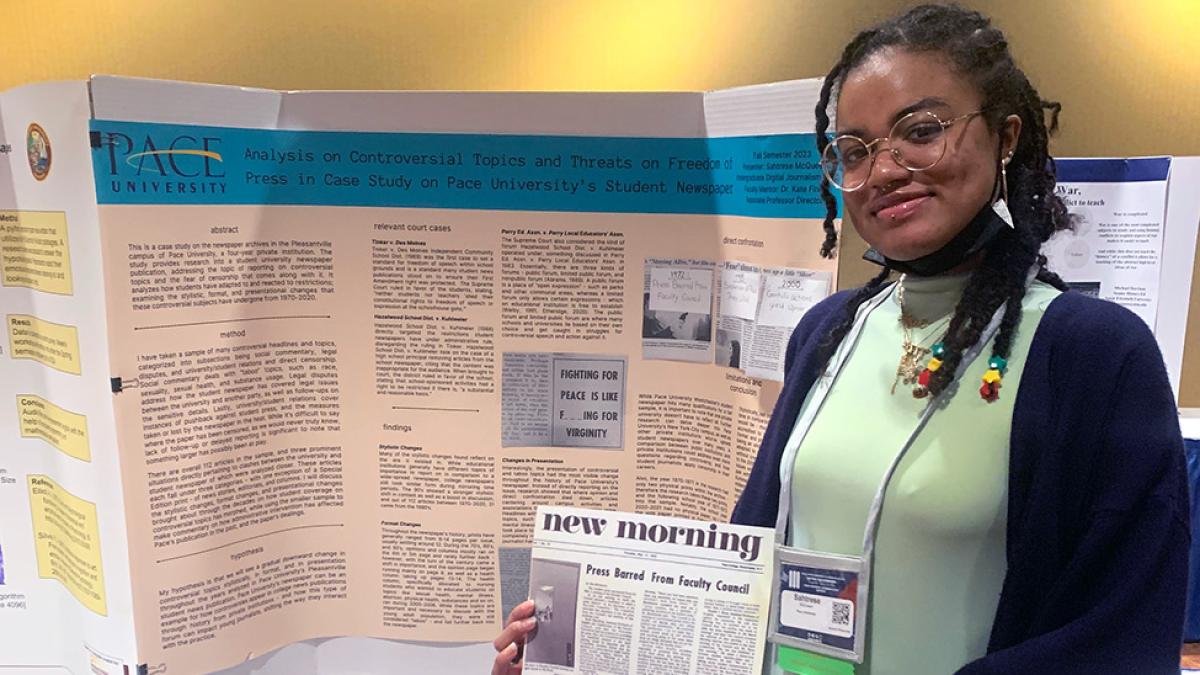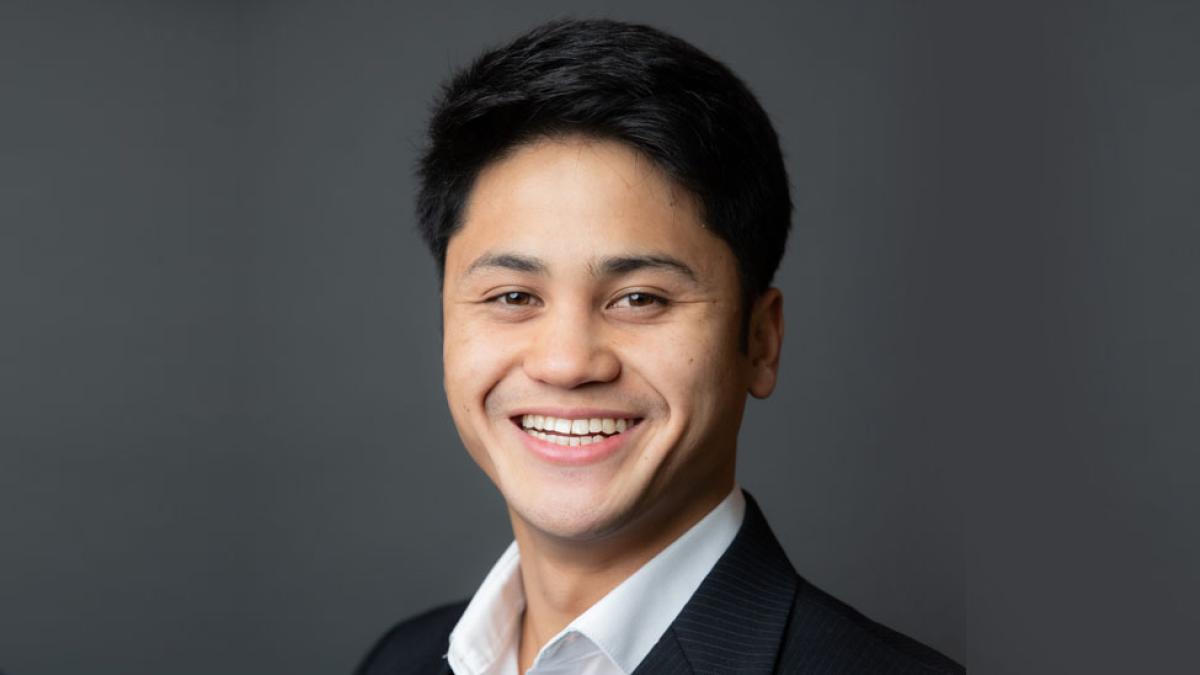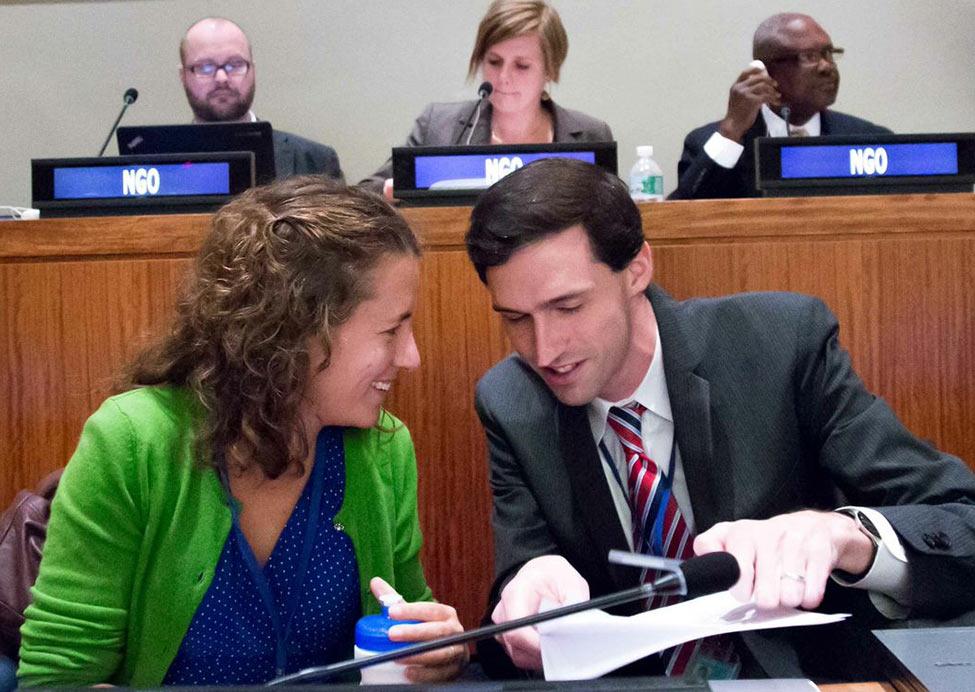
Student-Made Cookbook Offers Recipes for Campus Pantry Users
Pace University was highlighted in a recent article from Inside Higher Ed for its efforts in partnering with a local bank to offer a mobile market twice a month, providing fresh and frozen items around campus.
Don't Say Goodbye To Regents Exams; NY Is Years From Creating Alternative Assessments
School of Education Professor Christine Clayton speaks with Lohud – and Gannett newspapers statewide-- about the New York State Education Department creating alternative assessments for the Regents Exam. "What's concerning to me is that, you know, that commitment to this kind of project has to be maintained for years and years," said Christine Clayton, an education professor at Pace University.
Welcome to Eyewitness News Pedro Rivera
Pace alumnus Pedro Rivera '12 and co-anchor of WABC weekend morning news gives a heartfelt shoutout to his alma mater on Eyewitness News.
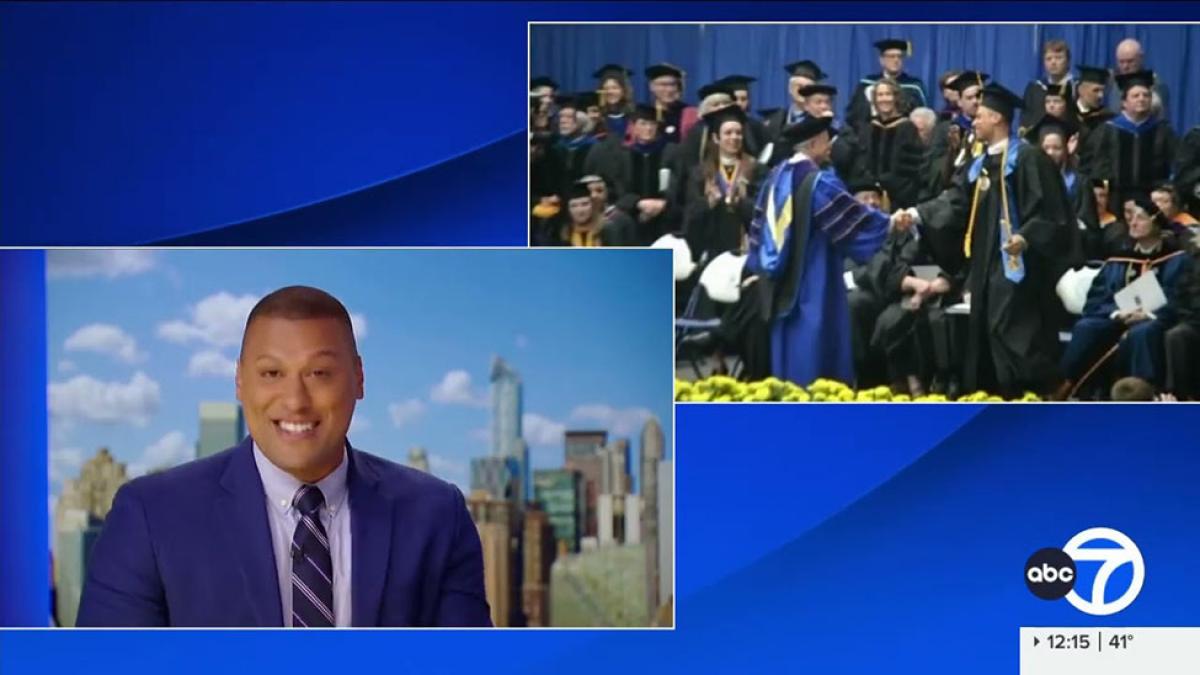
Westchester County Nonprofit Brings Domestic Violence Awareness To Teenagers, Young Adults
The Pace Women’s Justice Center (PWJC) was featured on CBS News showcasing their powerful work in the community, from providing free legal services for victims of abuse, to their innovative preventative outreach campaign, #LoveIsnt. The segment highlights the important discussions the PWJC is leading at local high schools to educate students on safety, legal rights, and how to recognize signs of abusive behavior.

Pace University Engages in Transformative Civil Rights Field Study in Alabama
Over 20 students, professors, and administrators from the Elisabeth Haub School of Law and Dyson College of Arts and Sciences at Pace University spent four days during their winter break in Montgomery and Birmingham, Alabama, visiting the offices of the Equal Justice Initiative (EJI) and several historical sites for an intense interdisciplinary civil rights field study.
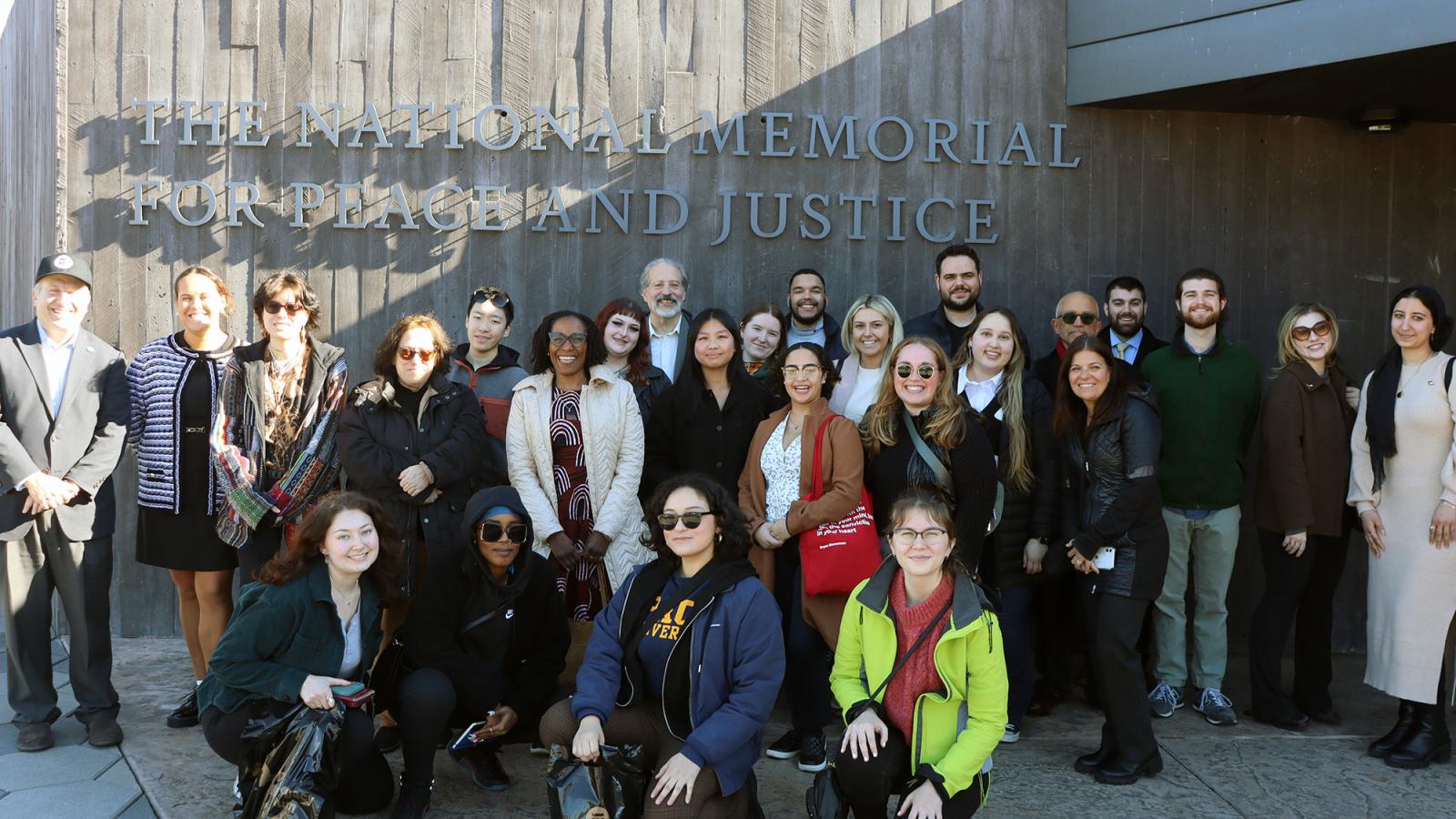
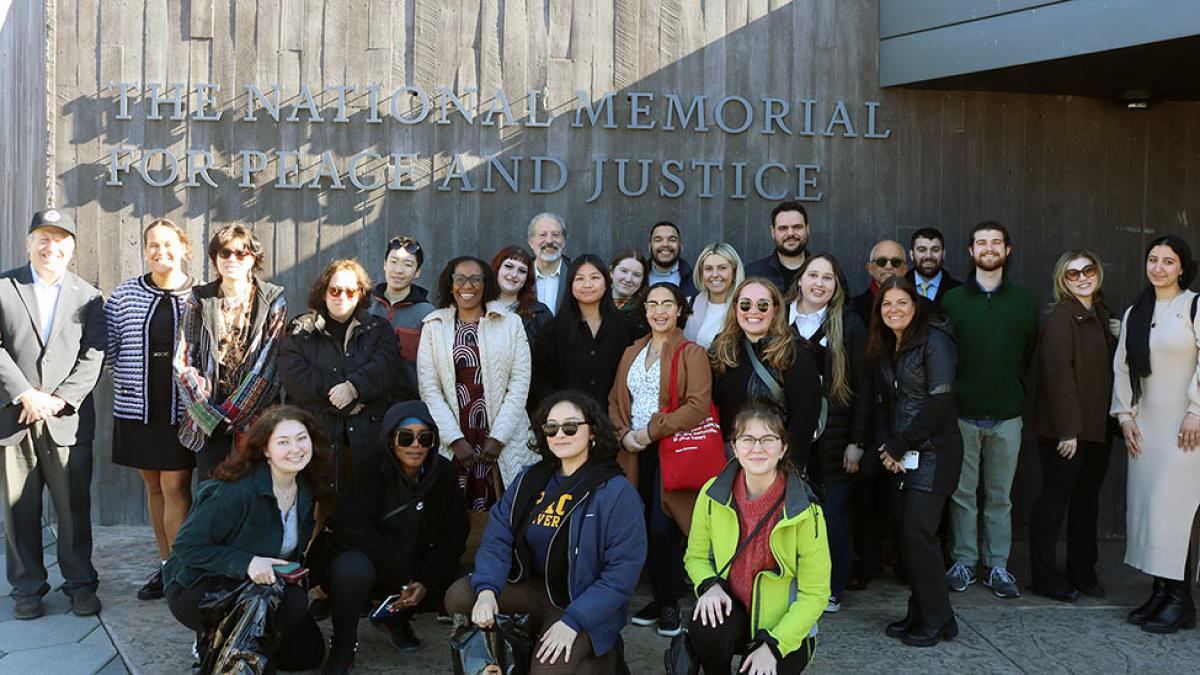
Focused on understanding social justice, combating mass incarceration, and confronting inequality
Over 20 students, professors, and administrators from the Elisabeth Haub School of Law and Dyson College of Arts and Sciences at Pace University spent four days during their winter break in Montgomery and Birmingham, Alabama, visiting the offices of the Equal Justice Initiative (EJI) and several historical sites for an intense interdisciplinary civil rights field study.
Founded in 1989 by Bryan Stevenson, a widely acclaimed public interest lawyer and bestselling author of Just Mercy, EJI is a private, 501(c)(3) nonprofit organization that provides legal representation to people who have been illegally convicted, unfairly sentenced, or abused in state jails and prisons. In 2018, EJI opened the National Memorial for Peace and Justice, dedicated to victims of slavery, lynching, and racial segregation, and the Legacy Museum, which recounts the history of slavery and continuing forms of racial injustice in the United States.
“I’m so pleased that President Krislov was able to facilitate this unique opportunity for our students,” said Haub Law Dean Horace E. Anderson Jr. “They not only received an unparalleled field experience, but they did so in an interdisciplinary way, demonstrating the partnership opportunity between law and the humanities.”
During the first day, students visited the Legacy Museum, travelling through 400 years of American history – from enslavement to racial terrorism, to codified segregation, to mass incarceration. Next, students visited the National Memorial for Peace and Justice, the nation’s first comprehensive memorial dedicated to the victim of racial terror lynchings. EJI’s Staff Attorney, Sofia McDonald then met with Pace faculty and students to inform them more about the work of EJI. After an insightful day, students were able to debrief with faculty and discuss their experiences among each other.
For Political Science major McKenna Crenshaw ’27, her introduction to EJI occurred during her sophomore year of high school through reading Just Mercy. Bryan Stevenson's inspiring work fueled her ambition, aspiring to contribute to EJI in the future. “I was absolutely blown away by the beautiful Legacy Museum and National Memorial for Peace and Justice,” said Crenshaw. “The heavy history and themes that the organization explored took its toll, but gave you space to digest and take in. It truly was an experience that you can only experience for yourself to understand.”
The following day, Pace visited the Freedom Rides Museum, located at the historic Greyhound bus station that tells the story of the Freedom Rides of 1961 and the Civil Rights Movement in Alabama through interactive exhibits, oral histories, and educational programming.
Faculty and students had the privilege of visiting the Federal Courthouse to meet Judge Myron Thompson, a United States District Judge for the Middle District of Alabama. He was nominated to that seat in September 1980 by President Jimmy Carter. In fact, he was the first African American Assistant Attorney General for the State of Alabama, the first African American bar examiner for the State, and the second African American federal judge in the State. Judge Thompson shared his experiences from his career and further history of Alabama with faculty and students. He even mentioned he contributed to the development of legal scholarship by serving as Jurist-in-Residence at the Elisabeth Haub School of Law in 2012.
“We are delighted that the civil rights field study to Alabama has not only enriched the experiences of our students and faculty but has also served as a source of inspiration,” said Tresmaine R. Grimes, Ph.D., dean of the Dyson College of Arts and Science. “At Pace, experiential learning is not just a part of our identity; it is the essence of who we are. Pace remains committed to amplifying experiential opportunities like this.”
Pace also visited the Alabama State Capitol, Department of Archives Museums of Alabama, Historic Bethel Baptist Church, Birmingham Civil Rights Institute, and the 16th Street Baptist Church.
“I am immensely grateful for the opportunity to have visited the various historical sites and landmarks that shed light on the struggles and triumphs of the civil rights movement,” said Haub Law student Madison Lane ‘25. “Walking in the footsteps of those who fought diligently for justice and equality was a humbling and eye-opening experience. It deepened my understanding of the challenges faced by marginalized communities and the importance of continuing the fight for social justice.”
“Students were so engaged and enthusiastic, as was I”, said criminal justice Professor Aviva Glasner. “This is an experience that is both indescribable and teachable and I look forward to sharing with my students everything I learned and will continue to learn”.
Check out additional photos from Pace University's civil rights field study to Alabama.
About Pace University
Since 1906, Pace University has been transforming the lives of its diverse students—academically, professionally, and socioeconomically. With campuses in New York City and Westchester County, Pace offers bachelor, master, and doctoral degree programs to 13,600 students in its College of Health Professions, Dyson College of Arts and Sciences, Elisabeth Haub School of Law, Lubin School of Business, Sands College of Performing Arts, School of Education, and Seidenberg School of Computer Science and Information Systems.
About Elisabeth Haub School of Law at Pace University
Elisabeth Haub School of Law at Pace University offers JD and Masters of Law degrees in both Environmental and International Law, as well as a Doctor of Juridical Science (SJD) in Environmental Law. The school, housed on the University’s campus in White Plains, NY, opened its doors in 1976 and has more than 9,000 alumni around the world. The school maintains a unique philosophy and approach to legal education that strikes an important balance between practice and theory. Haub Law launched its Environmental Law Program in 1978, and it has long been ranked among the world’s leading university programs, with a current #1 ranking by U.S. News and World Report. Pace’s doctoral graduates teach environmental law at universities around the world. Pace’s JD alumni are prominent in environmental law firms, agencies and non-profit organizations across the U.S. and abroad. In 2016, the Law School received a transformational gift from the family of Elisabeth Haub, in recognition of its outstanding environmental law programs.
About Dyson College of Arts and Sciences
Pace University’s liberal arts college, Dyson College, offers more than 50 programs, spanning the arts and humanities, natural sciences, social sciences, and pre-professional programs (including pre-medicine, pre-veterinary, and pre-law), as well as many courses that fulfill core curriculum requirements. The College offers access to numerous opportunities for internships, cooperative education and other hands-on learning experiences that complement in-class learning in preparing graduates for career and graduate/professional education choices.
A Race to Disarm: Professors Matthew Bolton and Emily Welty, Along with Pace Students, Advocate for Nuclear Disarmament
Dyson faculty members Matthew Bolton, PhD, and Emily Welty, PhD, are at the forefront of nuclear disarmament advocacy on a local and global scale. As the founders of the Pace Disarmament Institute, they welcome the many students who express interest in their work to get involved through internships, activism, and speaking opportunities.
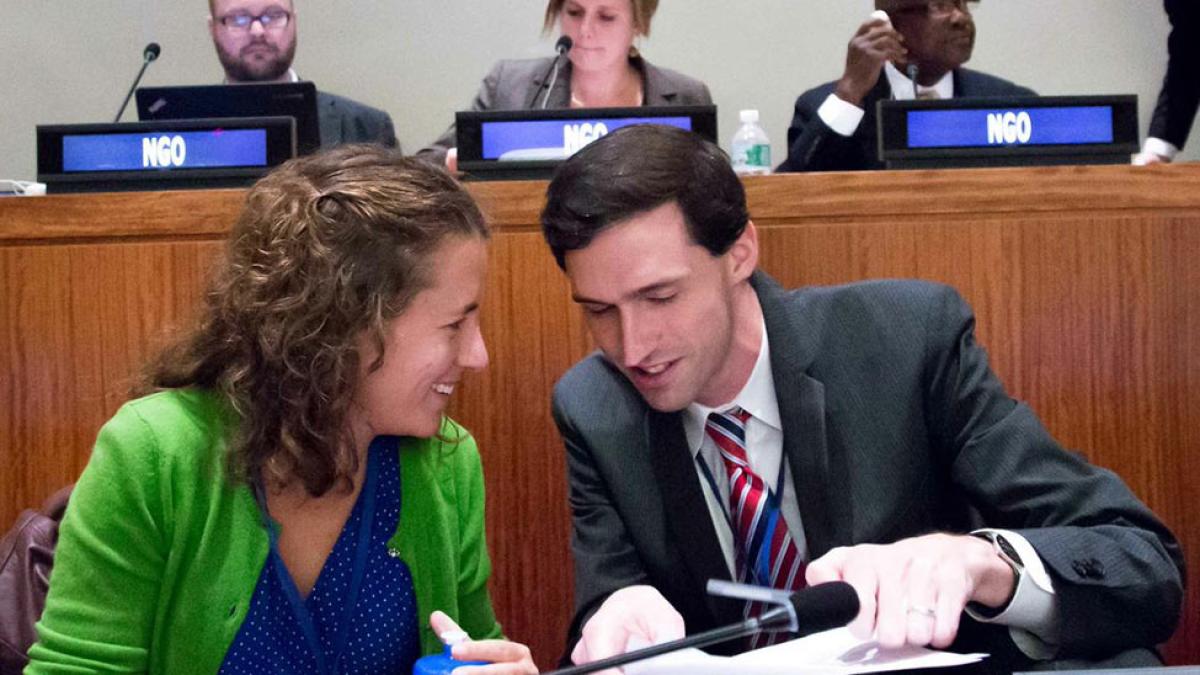

In November 2023, Dyson faculty Emily Welty, PhD, and Matthew Bolton, PhD, joined faith leaders from the World Council of Churches (WCC) on a human rights accompaniment trip to the Republic of the Marshall Islands, highlighting the ongoing impact of US nuclear testing.
The US government detonated 67 atmospheric nuclear tests in the Pacific country in the 1940s and 1950s, equivalent in power to more than 5,400 Nagasaki bombs. Welty and Bolton, a married couple who serve as co-directors of Dyson’s International Disarmament Institute, listened to affected communities, including college students, artists, government officials and healthcare professionals.
They learned that catastrophic humanitarian, human rights, and environmental legacies persist today in the Marshall Islands, including health problems, displacement, cultural trauma, and environmental contamination.
“The effects of nuclear violence in the Marshall Islands are a racial and climate justice issue,” said Welty, who directs the Peace and Justice Studies program in Dyson College. “Exposure to ionizing radiation raises the risk of cancer and yet there is no oncology unit in the Marshall Islands.” Radioactive material – including from the Nevada Test Site – stored at Runit Dome, Enewetak Atoll, is also at risk from the rising seas caused by global climate change.
Upon their return to the US, Bolton and Welty brought their experiences directly to Pace students, in their respective classes, Global Politics of Disarmament and Arms Control, and Reconciliation and Transitional Justice, illustrating the real-life consequences of subjects on the syllabus.
Students’ Experiential Learning at the UN
Welty and Bolton have also advocated in diplomatic spaces, such as at the United Nations headquarters here in New York City, calling on governments to join the 2017 Treaty on the Prohibition of Nuclear Weapons and assist communities affected by nuclear weapons production, use, and testing.
“We don't have to just accept passively the way things are,” said Bolton, Professor of Political Science. “With nuclear weapons, we can stop treating them as normal. There is a human story at the center, and we must share the experiences and voices of those who have been most affected.”
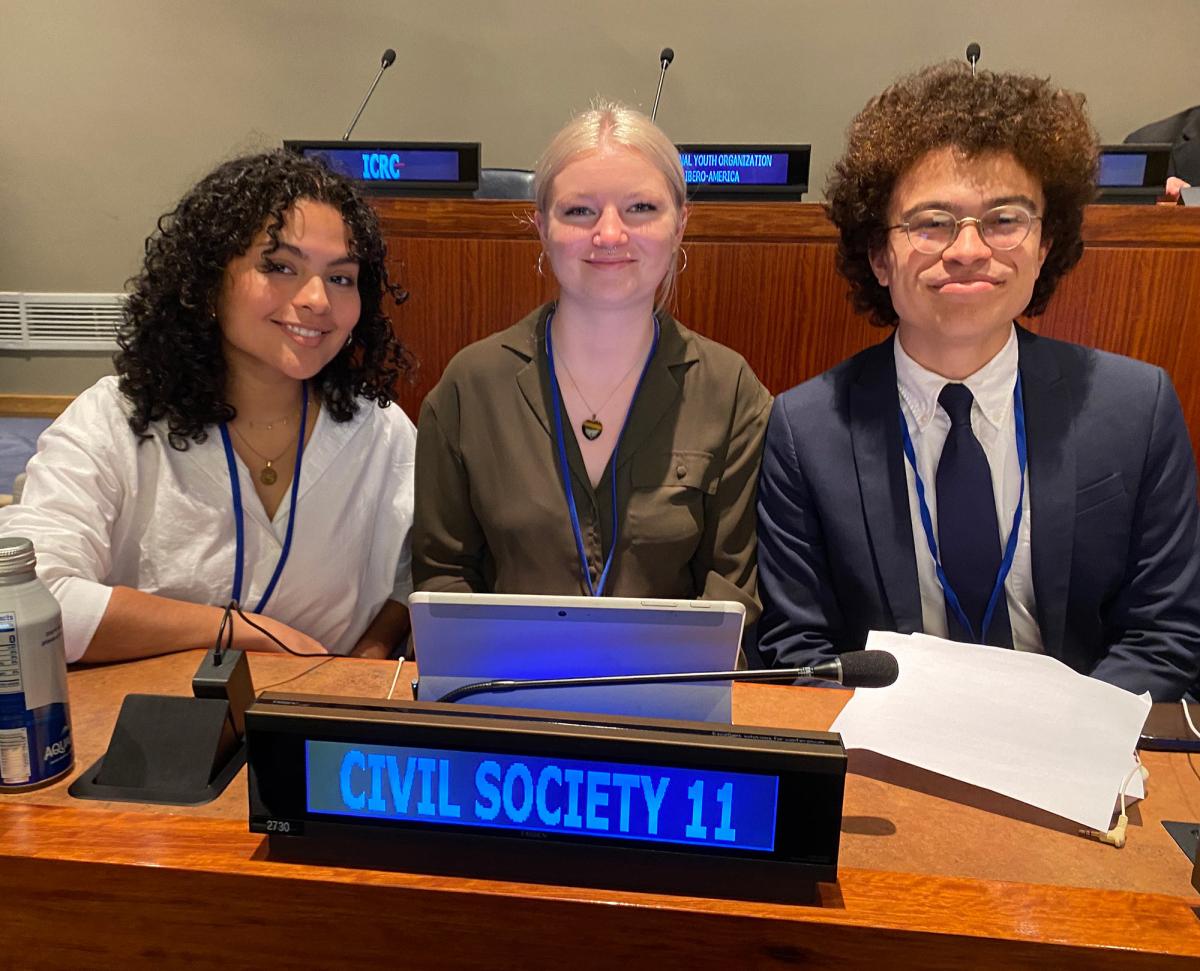
Welty and Bolton welcome the many students who express interest in such work. In October 2023, and as part of Bolton’s Global Politics of Disarmament and Arms Control course, Ellis Clay ‘25, Antje Hipkins ’24, and Jasmine Cintrón Soto ‘25, double majors in Peace and Justice Studies and Political Science, delivered statements to the UN General Assembly First Committee.
This experience was connected to an immersive internship, advised by Welty, in nuclear disarmament that featured direct engagement by the aforementioned students with multiple civil society organizations. These include the International Campaign to Abolish Nuclear Weapons, Reaching Critical Will, Youth for the Treaty on the Prohibition on Nuclear Weapons, and the New York Campaign to Abolish Nuclear Weapons.
The students called for greater participation of youth in international disarmament forums, consideration of the gendered implications of disarmament, and reserving cyberspace for peaceful purposes rather than war. The efforts of Clay, Cintrón Soto, and Hipkins were immediately recognized by the UN on social media.
The Pace International Disarmament Institute
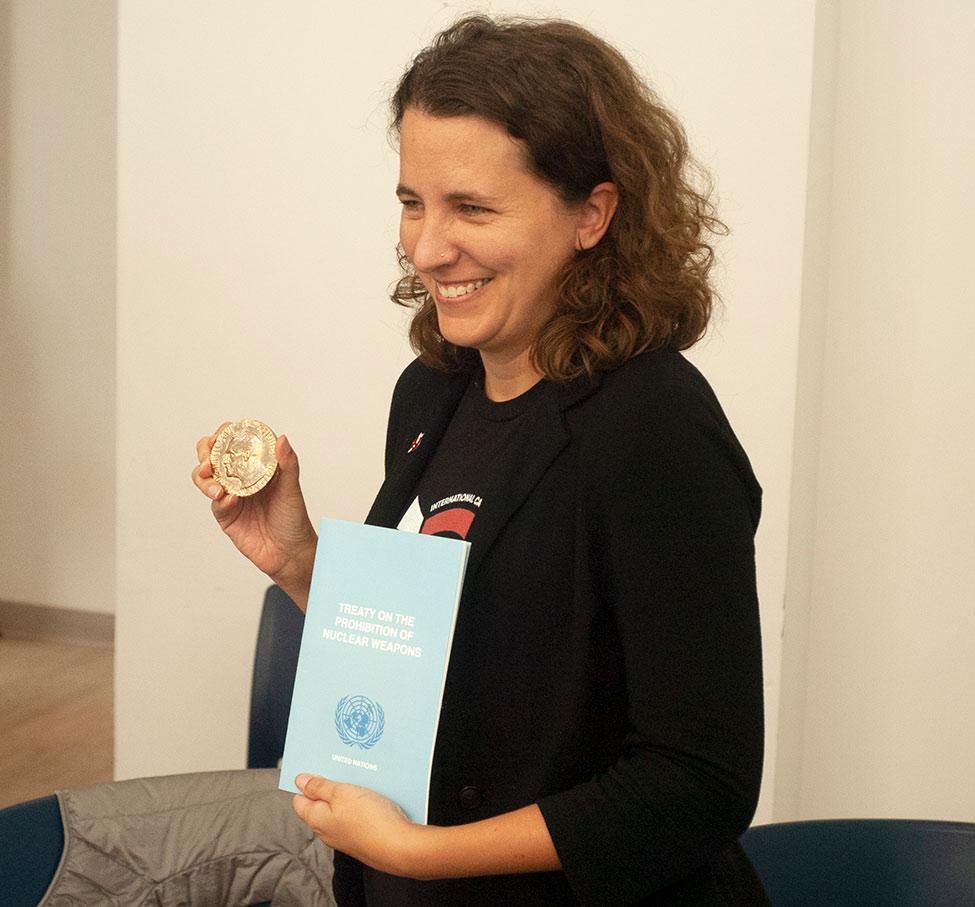
In 2017, Welty and Bolton were part of the International Campaign to Abolish Nuclear Weapons (ICAN) team awarded the Nobel Peace Prize for their “work to draw attention to the catastrophic humanitarian consequences of any use of nuclear weapons” and “ground-breaking efforts to achieve a treaty-based prohibition on such weapons.”
Since joining Pace six years earlier, they had been working with advocacy efforts seeking to restrict and mitigate the damage caused by inhumane weapons, including landmines, cluster munitions, military robotics, and the arms trade. Welty was serving as vice moderator of the WCC Commission on International Affairs and chairing its nuclear disarmament working group. In 2016, Bolton had received a grant from the United Nations to assist and train East African government officials on implementation of the 2013 Arms Trade Treaty.
With support from Dyson College, Bolton and Welty founded the International Disarmament Institute to give a framework for their work, and, just as importantly, to involve Pace students.
Since its creation, it is fast becoming a space of world-class education and research, playing a key role in support of disarmament policymaking, from humanitarian, human rights and environmental perspectives, with Pace’s contributions to promoting youth involvement in disarmament forums even being featured in a report by the UN Secretary-General.
A Local Perspective
Although the subject of nuclear weapons has recently occupied more space in the collective consciousness through the release of the film Oppenheimer (2023), the extent and potential impact of New York City’s association with it is still not fully nor widely understood.
The namesake Manhattan Project, a research and development undertaking during the Second World War that produced the first nuclear weapons, was initially headquartered in New York City. By the time of the Cold War, as many as 200 nuclear warheads were stationed in various sites in and around the five boroughs. In subsequent decades, New York City became a center of growing political and grassroots leadership on disarmament, as well as some of the largest marches, particularly in the 1980s, in US history calling for an end to the nuclear arms race.
As a result, nuclear weapons have been removed from the city. However, there are former nuclear weapons development sites that are still undergoing remediation, posing a risk to the often marginalized communities living nearby.

Since 2018, Welty and Bolton and several Pace students have been part of the New York Campaign to Abolish Nuclear Weapons (NYCAN), which successfully persuaded the New York City Council to pass historic local nuclear disarmament legislation. The 2021 bills reaffirmed the city’s status as a nuclear-weapons-free zone and called for both divestment of its pensions from companies involved in the production and maintenance of these weapons of mass destruction, and for the United States government to join the United Nations Treaty on the Prohibition of Nuclear Weapons.
Contributing to this advocacy, Bolton co-authored a peer-reviewed article with Katherine Ketterer ‘20, a former political science student of Bolton’s, on ongoing radioactive contamination from nuclear weapons production in New York City. Ketterer was interested in disarmament issues and had internships with related organizations in the city, including the UN. She had coincidentally reached out to Bolton shortly after she graduated, wanting to continue her research, and it was a green light to work together.
In September 2023, Bolton was appointed by New York City Council Speaker Adrienne Adams to be a member of the city’s Nuclear Weapons Free Zone and Nuclear Disarmament Committee, created by the new legislation.
“I feel very humbled and want to thank Speaker Adams for this appointment,” he said. “As an academic who has not worked in government before, this is an interesting opportunity to understand more about local government and help the city that I love being a part of address this important issue.”
Opportunities for Pace students to be change-makers and even peace makers (“pace,” translated from the Italian is, after all “peace”) are seemingly endless, inside and outside of the classroom.
“I am so proud of our Pace students, who have a grasp of this issue that certainly exceeds what either Matthew or I had at their age,” said Welty. “It’s also a testament to their goodwill, dedication, and curiosity, that they have really showed a lot of enthusiasm.”
In Bolton’s words, “We have the capacity to shake things up.”
Dyson Digital Digest: Winter 2024
In the Dyson College of Arts and Sciences, hands-on learning isn’t reserved solely for the science labs and art studios. Pace’s experiential approach to the humanities builds on the University’s long-standing commitment to undergraduate research and civic engagement.
Through a Provost’s Office Summer Research Grant, Lulu Moquete ’24, Mathematics, guided by her faculty mentor Emilio Fernández, PhD, stepped out of her academic comfort zone to analyze the cultural and sociological effects of colonialism on the Dominican diaspora.
Dyson College of Arts and Sciences Advisory Board Member and alumnus Paul Ryan ’86, Literature and Communications, was named the executive producer for NBC’s long-running news show Dateline. In this role, Ryan will oversee the broadcast, streaming, and podcast entities associated with the brand.
Looking Back to Move Forward
Twenty students from Pace’s Haub School of Law and Dyson College embarked on a profound interdisciplinary field study to Alabama alongside the Equal Justice Initiative, looking into history to understand its impact on the present and actively seek ways to eliminate injustice and inequality.

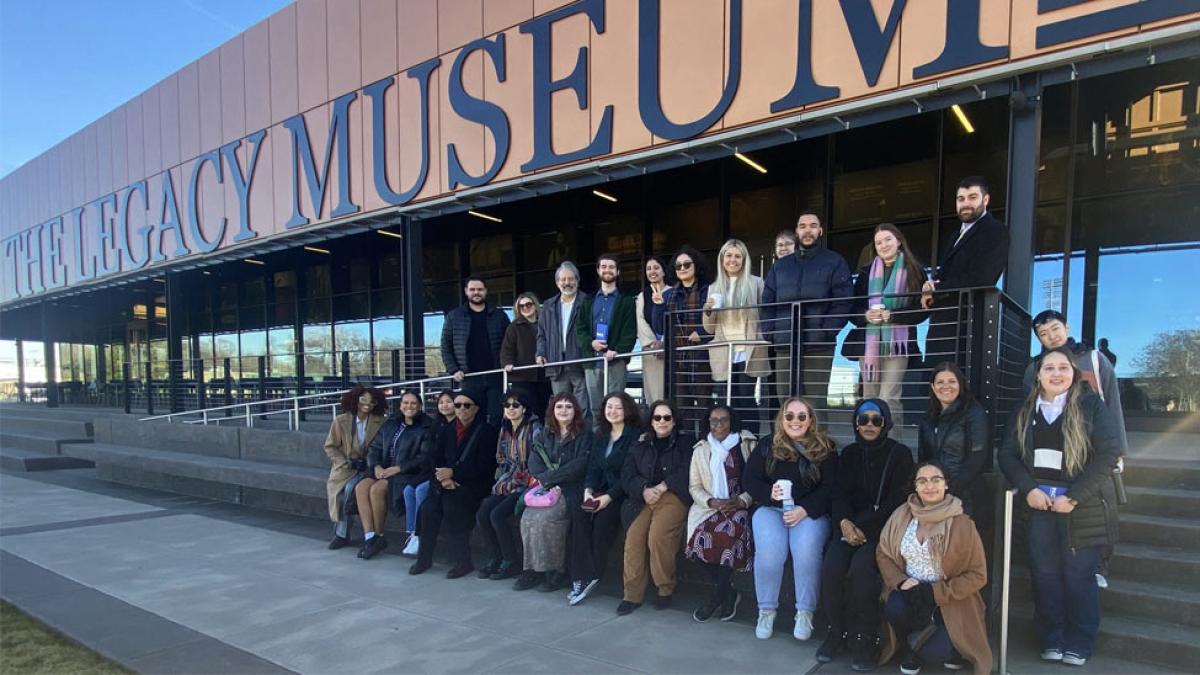
During this year’s winter break, 20 students from Pace’s Haub School of Law and Dyson College embarked on a profound interdisciplinary field study in Montgomery and Birmingham, Alabama. Led by distinguished Haub Law professors Randolph McLaughlin, Debra Cohen, and David Dorfman, the immersive program delved into the heart of civil rights history, hosted at the Equal Justice Initiative (EJI) Headquarters and various Legacy sites.
Very thoughtful, mature, and respectful discussions were generated by what we witnessed and experienced during this field study.
The learning objectives were ambitious, seeking to provide students with a comprehensive understanding of the historical trajectory of race in the United States—from slavery through emancipation, reconstruction, the Jim Crow era, the Civil Rights movement, to the present-day challenge of mass incarceration. The course also aimed to explore the intersection between this history and the realms of criminal law, criminal procedure, prisoner rights, and civil rights litigation.
“The experience was eye-opening and life changing. The students were receptive, open-minded, and curious,” says University Counsel Terryl Brown, who served as a chaperone on this inaugural trip. “Very thoughtful, mature, and respectful discussions were generated by what we witnessed and experienced during this field study.”
The field study experience emphasized the need for every student to walk back into history, understand its impact on the present, and actively seek ways to eliminate injustice and inequality.
The Pace team visited various sites, including the Freedom Rides Museum, Department of Archives Museum of Alabama, and the Alabama State Capitol. The journey began at the Legacy Museum, where the students were confronted with a poignant portrayal of the Atlantic crossing, human trafficking, economic justifications, and the heartbreaking stories of families torn apart. The subsequent visits to the National Memorial for Peace and Justice, meetings with EJI attorneys, and discussions with Judge Myron Thompson provided hope and inspiration for actions to address the lingering injustices.
I was absolutely blown away by the beautiful Legacy Museum and National Memorial for Peace and Justice.
Mckenna Crenshaw ‘27 highlighted the emotional impact of the trip. Crenshaw, inspired by reading Bryan Stevenson's Just Mercy while still in high school, rediscovered her passion for the Equal Justice Initiative, emphasizing the importance of public awareness about issues within the legal system. The trip left a lasting impression on Crenshaw, reigniting her commitment to pursuing a career in social justice.
“I was absolutely blown away by the beautiful Legacy Museum and National Memorial for Peace and Justice. The heavy history and themes that the organization explored took its toll, but gave you space to digest and take in,” says Crenshaw. “If the sophomore year of high school version of myself learned that I was given this opportunity, she would be in tears and beyond excited.”
This intersession experience was not just a field study; it was a transformative journey that immersed Pace University students in the heart of civil rights history, fostering a profound understanding of the past and inspiring a commitment to addressing present-day injustices.
Images From the Trip
More from Pace
Razing Liberty Square unveils the untold story of Miami's Liberty City and the impact of climate gentrification. Professor Corinna Sager shares her journey of producing this groundbreaking documentary, how she integrated the experience into her classes, and why she believes in the power of asking questions.
Sahtrese McQueen, a Digital Journalism major at Pace, presented research at the MSCHE conference that explored how Pace's student newspaper dealt with controversial issues over different decades.
Towards the end of his army contract, Joseph Ingles '25 was searching for a business school that would provide him with a smooth transition from his logistics-focused role. After a strong recommendation from a lieutenant, Joseph landed at Lubin, where he has since gained real-world marketing experience and made it his mission to shed light on the importance of mental health.
Raising Questions about Razing Liberty Square
Razing Liberty Square unveils the untold story of Miami's Liberty City and the impact of climate gentrification. Professor Corinna Sager shares her journey of producing this groundbreaking documentary, how she integrated the experience into her classes, and why she believes in the power of asking questions.

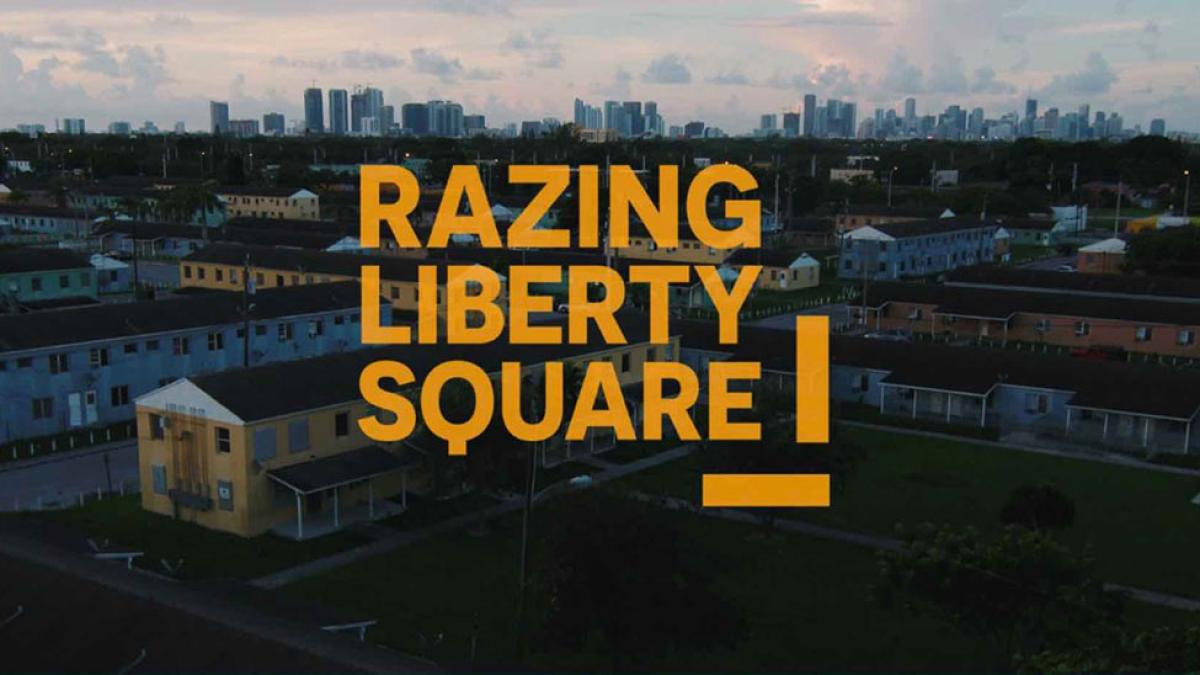
Corinna Sager is a producer, speaker, and educator. She’s produced everything from international events to feature films and has been teaching at Pace since the introduction of Dyson’s Media Communications and Visual Arts program in 2010.
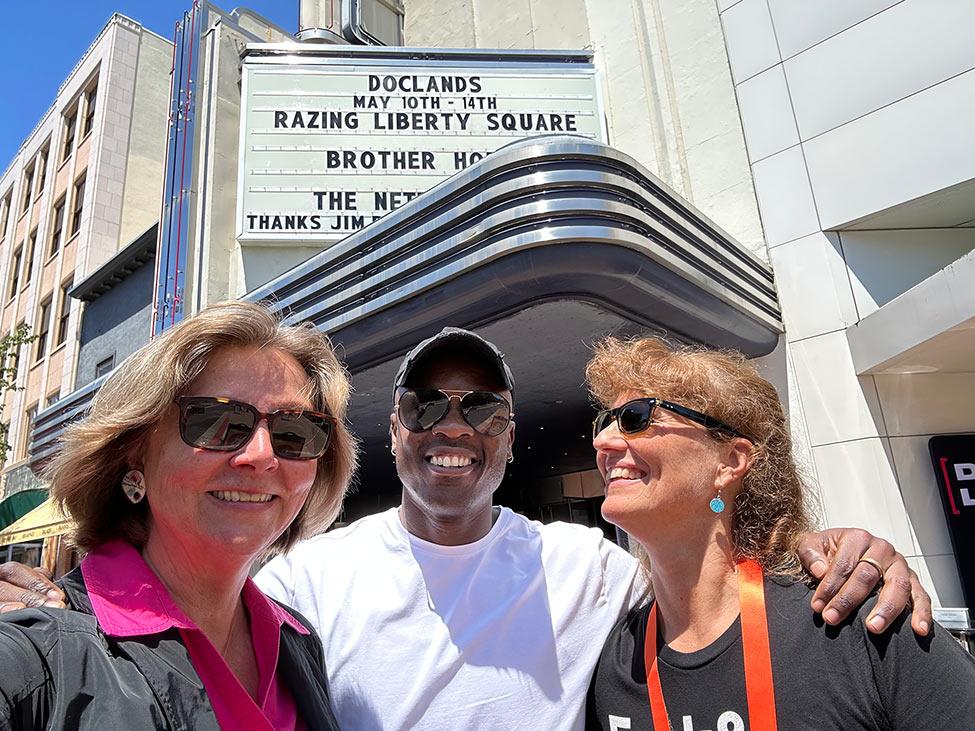
And for the past four years, she’s worked as a producer on a groundbreaking documentary about how climate gentrification is affecting a historically Black public housing project in Miami, Florida. After years of filming, editing, and fighting to ensure the story was told, the feature-length documentary Razing Liberty Square premiered on PBS on January 29, 2024.
Her experience on Razing Liberty Square, as a producer in general, and as an educator all follow a common theme: Ask questions.
“I always ask questions, I'm always curious,” Sager says.
Her curiosity was certainly piqued when her close friend and frequent collaborator Katja Esson reached out to ask for help on this Miami-based project. Both Sager and Esson hail from and met in Hamburg, Germany, and both have lived in Miami. Ironically, Esson moved to Miami at Sager’s suggestion, who attended the University of Miami and thought it would be a great fit for Esson’s film and theater aspirations.
I always ask questions, I'm always curious.
Esson learned about the plans to raze and rebuild Liberty Square in 2017 and soon picked her camera to follow the process. “You know, as a European, we always think ‘why is America constantly tearing things down?’” Sager explains. But Esson had no idea just how complicated the story was about to get as she began filming.
Liberty Square is an area of public housing in the Miami neighborhood Liberty City. It’s the first public housing project of its kind in the American South and for years was separated by a wall, physically segregating the predominantly Black community from the surrounding areas. Integration triggered a “white flight” from the surrounding area by anti-integration white citizens, and Miami began to invest less in the Liberty City area as a whole. This, coupled with the development of more public housing nearby, caused Liberty City, and especially Liberty Square, to become an area of concentrated poverty and crime.
In recent years, the city of Miami took an interest in Liberty Square. The urban development company Related Urban unveiled plans to revitalize the area, bringing in national chains, community centers, and brand new residences to create a mixed-income community.
The cause for the sudden interest in reinvesting in this neglected neighborhood? Climate change. Liberty City sits on a ridge 12 feet above sea level. As such, it is not subjected to the same amount of flooding and natural disasters as other parts of Miami. It’s now prime real estate.
Related Urban promised the residents of Liberty Square they would not be displaced, and that impact would be minimal. Some residents of Liberty Square were excited for the chance to live in brand new spaces in an up-and-coming neighborhood. But many others expressed suspicion and skepticism; they had lived through past revitalization projects in which similar promises were made and broken.
As a producer, you have to know and understand everything.
As Katja Esson documented these stories, each new layer brought more questions. What is climate gentrification? Could the development company be telling the truth? Would this usher in a new era of prosperity for the residents of Liberty Square? Or would this be a case of history repeating itself?
As the story became more complex by the day, Esson reached out to Sager to see if she would be interested in lending a hand as another producer. Sager joined the production in January 2020.
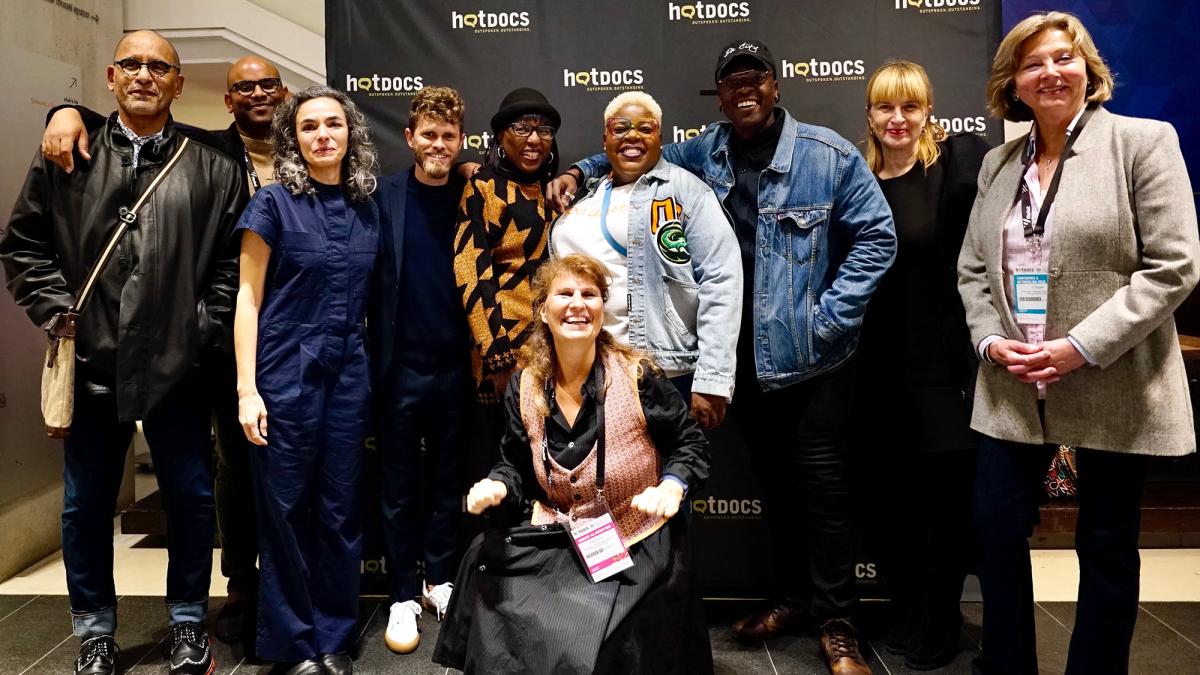
“It was a lot of learning,” Sager explains. “We were dealing with gentrification, with people being moved out, with Section 8 housing vouchers.” Not to mention the stress that the looming pandemic would put not only on the unfolding situation, but production itself.
They were also chasing questions. Not just their own, but the questions from the people they were following. What was Related Urban actually promising? Were these options actually just another form of displacement? “We had to edit for almost three years, because we were really trying to figure out a way to make these different subject matters intersect and make people get it.”
And throughout all of this, Sager was teaching at Pace.
During the final stretch of post-production for Razing Liberty Square, Sager was teaching her class Producing: Script to Schedule, and she was able to bring in everything she was experiencing to her students. “That part was easy, because I was living it,” she said. “My goal is always to treat my students like young professionals, and not like students.”
My goal is always to treat my students like young professionals, and not like students.
Sager invited Esson and others involved in the project, as well as other colleagues, to speak with her class and share their expertise. Students received a more holistic perspective as they learned from directors, post-production professionals, editors, and more who could speak to different aspects of production. “As a producer, you have to know and understand everything,” Sager explains. “You need to understand your team when they say something. If you don’t, you have to ask questions.”
These students, who were preparing a pitch of their own project for finals, were also able to review some of the professional pitches Sager and the Razing Liberty Square producers submitted to entities such as the Sundance Institute and PBS. Students could follow along and see how the approach changed over time, how it was adapted for different stakeholders, and how their pitches evolved with the project.
“Every production is a learning process,” Sager explains. “You have to be open to learning, you have to be open to asking questions. And you have to never be afraid to ask questions. You do not look stupid. On the contrary, if you ask questions, it shows that you're interested. It shows that you want to learn, and you really want to get an understanding.”
It’s not just about asking questions and being willing to learn, it’s also about excellent communications skills.
But just like with Razing Liberty Square, asking questions is just the beginning.
“It’s not just about asking questions and being willing to learn, it’s also about excellent communications skills,” Sager says. Across all of her classes—from public speaking to international communications to producing—Sager impresses upon her students the importance of learning to communicate effectively to work as a team and bring understanding.
Razing Liberty Square serves as perfect evidence of these principles. It began with a question: what is happening to Liberty Square? After years of filming, navigating competing interests, and delving into complex, multi-layered issues, curiosity was only the starting point. It took the ability to work across competing interests, nuanced storylines, and multi-faceted issues to bring the story to life.
Answer the question of what becomes Liberty Square in the new documentary, Razing Liberty Square on PBS or streaming online.
A Brief Legal History of Wisconsin Conservation
Pace | Haub Environmental Law Professor Jason Czarnezki's article "A Brief Legal History of Wisconsin Conservation,” co-authored with 3L Carolyn Drell, was published in the Marquette Law Review. The article examines the legal history of Wisconsin conservation — how the state’s conservation values were expressed in law, how its natural resources law has evolved and what that has (and has not) embodied, and how Wisconsin helps us define modern concepts of “conservation.”
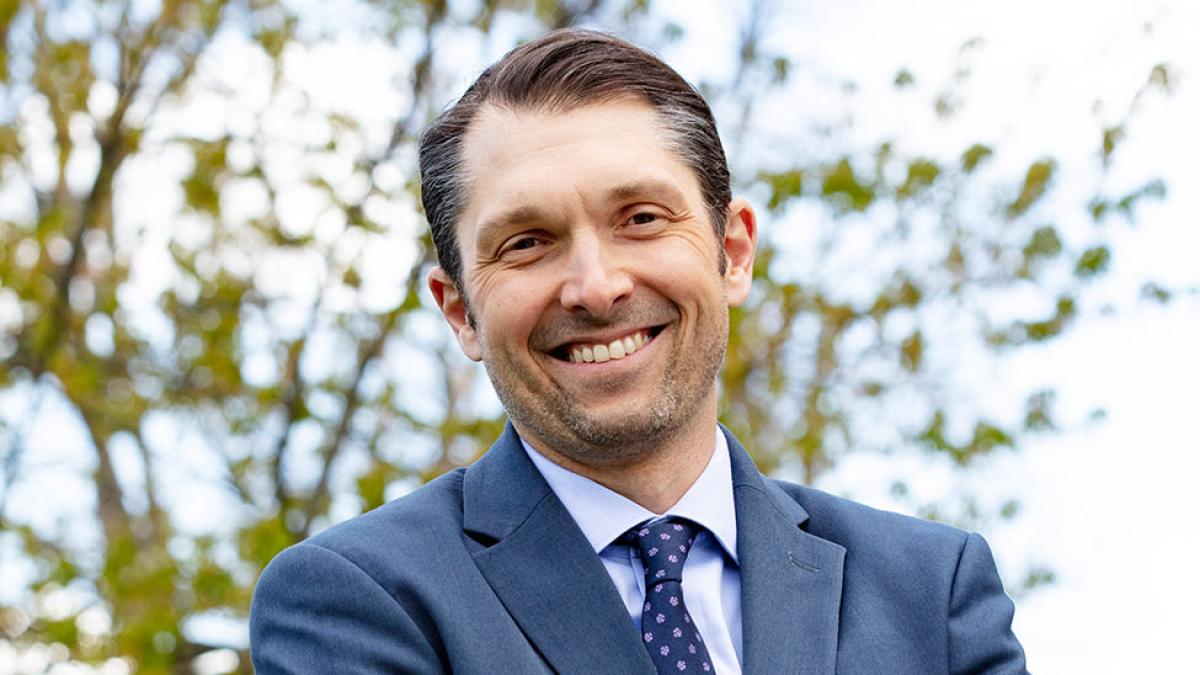
Pace | Haub Environmental Law Professor Jason Czarnezki's article "A Brief Legal History of Wisconsin Conservation,” co-authored with 3L Carolyn Drell, was published in the Marquette Law Review. The article examines the legal history of Wisconsin conservation — how the state’s conservation values were expressed in law, how its natural resources law has evolved and what that has (and has not) embodied, and how Wisconsin helps us define modern concepts of “conservation.”
Born and raised in Wisconsin, Professor Czarnezki recounts his own childhood interest in environmental issues sharing the early visionary work of Gerald Czarnezki (Grandpa Gerry), who was, at the time, considered something of a radical conservationist, as well as the work of his father Joe Czarnezki, who drafted and sponsored significant environmental legislation while serving in the Wisconsin State Senate and Assembly.
Hands-On Humanities: Experiential Learning in Unexpected Places
In the Dyson College of Arts and Sciences, hands-on learning isn’t reserved solely for the science labs and art studios. Pace’s experiential approach to the humanities builds on the University’s long-standing commitment to undergraduate research and civic engagement.

Thinking about studying the humanities may conjure images of dusty textbooks and snoozy lectures. In the Dyson College of Arts and Sciences, however, hands-on learning isn’t reserved solely for the science labs and art studios. In fact, Pace’s experiential approach to the humanities, particularly in the English department, has garnered national attention in media outlets such as The New Yorker, Inside Higher Ed, and The Chronicle of Higher Ed.
The experiential humanities at Pace build on the University's longstanding commitment to undergraduate research and civic engagement, as well as on recent initiatives in the digital humanities, public humanities, community-engaged art, and antiracist education. It is an approach designed to empower students to explore and participate in the production of knowledge about the past and present; to make sense of the history and current lived experiences of racism, sexism, and economic inequality; and to blaze new pathways for achieving social justice and creating a better world.
“The humanities have been undergoing a transformation for some time now that is about questioning who are we studying when we're studying the humanities or who are the humanities really for?” said Associate Professor of English Kelley Kreitz, PhD, Pace’s newly appointed director of experiential learning and the Pace Path. “To do that, you need to rethink how knowledge is produced in the first place and who is producing knowledge. And suddenly the experiential part of the humanities becomes not only something that makes sense, it becomes necessary.”
In addition, Pace University was recently awarded a total of $350,000 through a pair of grants from the National Endowment of the Humanities (NEH) that will help cement Pace as a hub for the humanities through new projects, community partnerships, and instructional spaces.
Take a look at a few of many examples of how the humanities are coming to life at Dyson.
AMS 333 Chinatowns in the Americas (NYC campus)
Associate Professor of English Stephanie Hsu, PhD, designed the Chinatowns in the Americas course as one of Pace’s designated civic engagement courses as a form of resistance to the anti-Asian racism—particularly in the wake of the COVID-19 pandemic—that’s been directed at Chinatowns, including the neighborhood adjacent to Pace’s downtown campus.
“For us in this course, experiential learning revolves around another key concept: mutual aid,” said Hsu, “which means that we’re listening to our community partners (cultural and social services nonprofits in Chinatown) and trying to meet the actual needs they describe by using our skills and resources in new and innovative ways that benefit and improve us, too, as individuals and as an institution.”
Through the course, Pace students are connecting directly with community members to learn about the political developments and quality of life issues facing Manhattan’s Chinatown, including real estate development, eminent domain land seizures, the city’s plans to build a “mega-jail,” and food insecurity driven by high food prices.
CMS 309 Girls’ Media Studies: Theory and Research (NYC campus)
In spring 2023, students in the Girls’ Media Studies course, taught by Professor of Communication and Media Studies Emilie Zaslow, PhD, partnered with the online Girl Museum to create an exhibit in the museum’s first student-led collaboration. As part of this initiative, each student first conducted research on the topic of girlhood and media between 1910-1960, and then selected a toy advertisement that targeted girls or advertised toys intended for girls during this era. In addition, a museum educator from the Girl Museum visited the class virtually and presented a session on writing and interpretation for virtual museum audiences, after which, each student expanded their research, wrote an analysis, and engaged in peer reviews.

Ari Cardenas ’23, Communication and Media Studies, selected an advertisement for the “Tiny Tears” doll, whose marketed feature was its ability to cry “real” tears. Researching the manufacturer, the American Character Doll Company, Cardenas gained an understanding of the era when the toy was made as context for examining the language of the advertisement and the purpose of the toy, which is to prepare young girls for motherhood through a doll that mimics an actual baby.
“I found it really interesting to explore this cross-examination of the ingrained gender roles and the role that our media plays in socializing us at an incredibly young age,” said Cardenas. “I hope that this opens people’s eyes and allows people to think a bit differently as to how they are contributing to perpetuating gender roles or how today’s media does it as well.”
ENG 223A: Creating a Good Life (Westchester campus)

Taught by Lecturer of Writing and Cultural Studies Alysa Hantgan, MFA, Creating a Good Life “explores the intersection of research on creativity, productivity, success, and happiness.” Students in the course explore the existing body of happiness research and begin to incorporate strategies discussed in the research—such as practicing meditation, engaging in new activities with friends, participating in aerobic exercise, and writing gratitude cards—into their own lives to explore their impact on happiness.
“Through interactive means and creative experiences, each student focused on specific gauges of their life (work, play, love, and health) and narrowed in on the few that could be improved,” said Lydia O’Briskie ’25, Early Childhood Education (School of Education). “The material of this course led me to visualize the improvement of my gauges, as I was focusing on love and health. As a result of my research and investigation, I learned to appreciate those that I love and to show gratitude, in addition to taking better care of my body and mental health.”
Upon conducting this experiential “me” search, students employ creative writing to share their findings on their new understanding of what makes a “good life.” Angela Sgobbo ’25, Early Childhood Education, chose to present her work through the creation of a children’s book.
“This dynamic presentation not only added a layer of creativity to the autoethnography, but also allowed for a more immersive exploration of my struggles, triumphs, and the broader cultural implications of my pursuit of a good life,” said Sgobbo. “Through this innovative approach, I sought to resonate with the themes of the class while maintaining the integrity of autoethnographic research.”
ENG 322A: The Art of the Memoir (Westchester campus)
In The Art of the Memoir, Assistant Professor of Writing and Cultural Studies Vyshali Manivannan, PhD, employs strategies, such as body scanning and body mapping, to help inform and deepen students’ writing about their own lives. Body scanning is a meditative practice that helps students bring awareness to physical sensations and emotional states, as well as the connection between them. Body mapping is an art form in which students use body diagrams to locate and record these sensations.
“A short trauma-informed body scanning session can effectively and safely reconnect writers with immediate sensation; a brief trauma-informed body mapping exercise can help writers develop somatically-located and -focused narratives of lived experience from those sensations,” said Manivannan.
“This class focused on embodiment and writing about embodied experiences,” said Hannah Mills ’26, Writing and Cultural Studies. “The mindfulness techniques that we practiced in class and that were interworked within my drafting process have been very meaningful to develop. These strategies have impacted the way I approach writing about my life experiences and connecting with myself and my writing.”
Manivannan, who also employs yoga practices and gamification techniques in many of her classes, noted that students have delivered their memoir project in a variety of forms, including Canva infographics, interactive websites, and audiovisual projects.
HIS 196H COVID-19 and Black Lives Matter: Comparative, Crisis-based Oral History in the American Experience (NYC campus)
In HIS 196H, a designated civic engagement course taught by Clinical Associate Professor of History and Assistant Provost for Research Maria Iacullo-Bird, PhD, students conduct and interpret oral history interviews surrounding the COVID-19 crisis and Black Lives Matter movement in America. Students are trained as oral historians, focusing on the Pace University and Lower Manhattan communities, to gain a deeper understanding of the intersection of infectious disease and social justice.
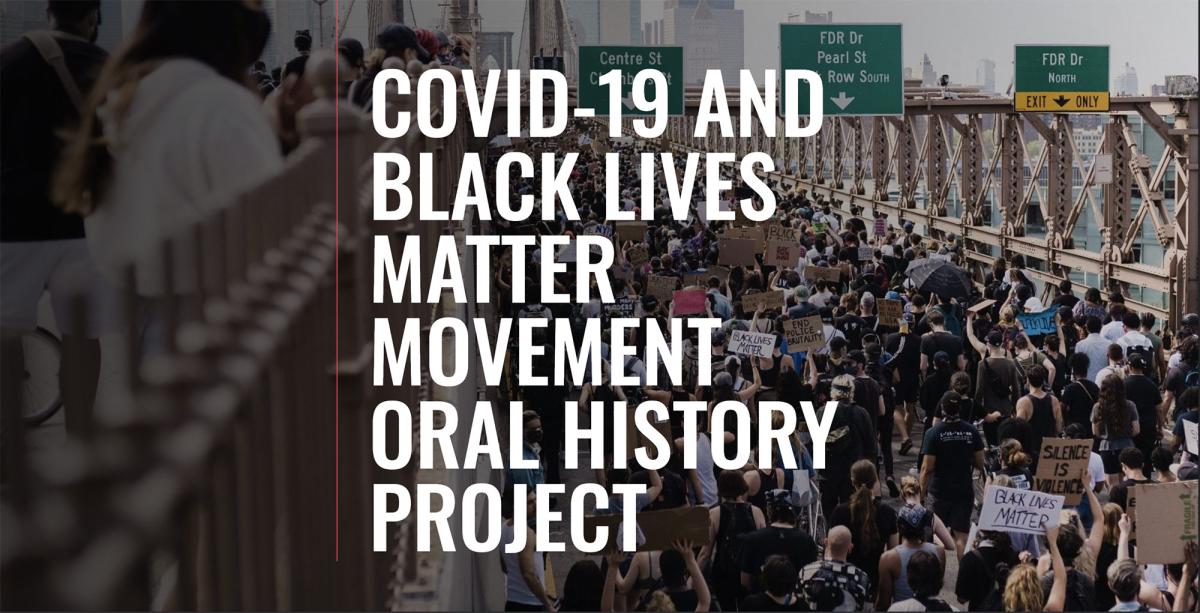
“Oral history allowed me to understand both COVID-19 and the Black Lives Matter movement from individual perspectives,” said Madison Turunen ’23, History and Peace and Justice Studies. “Much of my understanding came from the media, my inherent biases and beliefs, and my circle of friends and family. With the interviews, I was able to learn from the experiences I did not interact with: healthcare professionals and community organizers. It is one thing to read statistics and reports, it is a complete other to hear first-hand experiences."

The goal of this course is also to create a digital archive centered on these concurrent crises. The video recordings and transcripts of the oral history interviews are compiled on a blog site, allowing public access to the students’ findings. Students in the course have also presented their work as part of Pace’s annual Social Justice Week.
LIT 211U Latina/o Voices: Transnational Currents in American Writing (NYC campus)

In Kreitz’s introductory Latinx literature course, the class explores the Spanish-language publishing that began in the 19th century in the neighborhood surrounding what is now Pace’s downtown Manhattan campus. Kreitz noted that, because this is an understudied area of publishing, it can be a challenging topic to teach.
“It becomes necessary to engage students in recognizing where the gaps in the archive are and why they happened in the first place,” said Kreitz, who has also received funding from the National Endowment for the Humanities for her work.
The class participates in a series of assignments where students create a digital map, often after visiting significant locations in the neighborhood, researching sites of 19th century Spanish language press. The goal, then, is for students to not only to recognize the vibrant community that existed right in their backyard, but also to be a part of making that history visible.
“We don’t really understand the lives, hopes, and struggles of those publishing in the Spanish language until we make a dedicated effort to study it,” said El Aparacio ’25, English Language and Literature, who took the course. “This project pinpoints the locations of these impactful newspapers and brings them into focus. We find the when and where of Spanish language press, then we’re able to further contextualize their importance—the why. Above all, it really made me appreciate the people dedicated to preserving this part of print history.”
PHI 230: Philosophy of Happiness (Westchester campus)
In Philosophy of Happiness, taught by Lecturer of Philosophy and Religious Studies Len Mitchell, PhD, students engage in personal exploration and collaborative discussion in reflecting on philosophers’ ideas on happiness. The course includes critical reading of three texts, with students participating in storytelling exercises to describe a personal experience related to the material and group activities to investigate varied perspectives of happiness.
“What makes this course unique is the open dialogue between students and Dr. Mitchell,” said James Kennedy ’24, Personality and Social Psychology. “The class is designed to allow students to share how they interpret each topic discussed. This method of teaching creates a more comfortable environment where students can openly speak to the class to provide their own opinions regarding how the topic relates to happiness and can gain valuable new perspectives from others.”
Students are asked to write responses to prompts about their ideas about happiness on the first day of class. On the last day of the semester, Mitchell asks them to answer the same questions and reflect on how their ideas and understanding have evolved throughout the course.
Dyson Digital Digest: Winter 2024
In the Dyson College of Arts and Sciences, hands-on learning isn’t reserved solely for the science labs and art studios. Pace’s experiential approach to the humanities builds on the University’s long-standing commitment to undergraduate research and civic engagement.
Dyson faculty members Matthew Bolton, PhD, and Emily Welty, PhD, are at the forefront of nuclear disarmament advocacy on a local and global scale. As the founders of the Pace Disarmament Institute, they welcome the many students who express interest in their work to get involved through internships, activism, and speaking opportunities.
Dyson alumna Juliana Martins ’19 is a Forbes 30 Under 30 entrepreneur whose success is built on communications and business skills developed at Pace.
